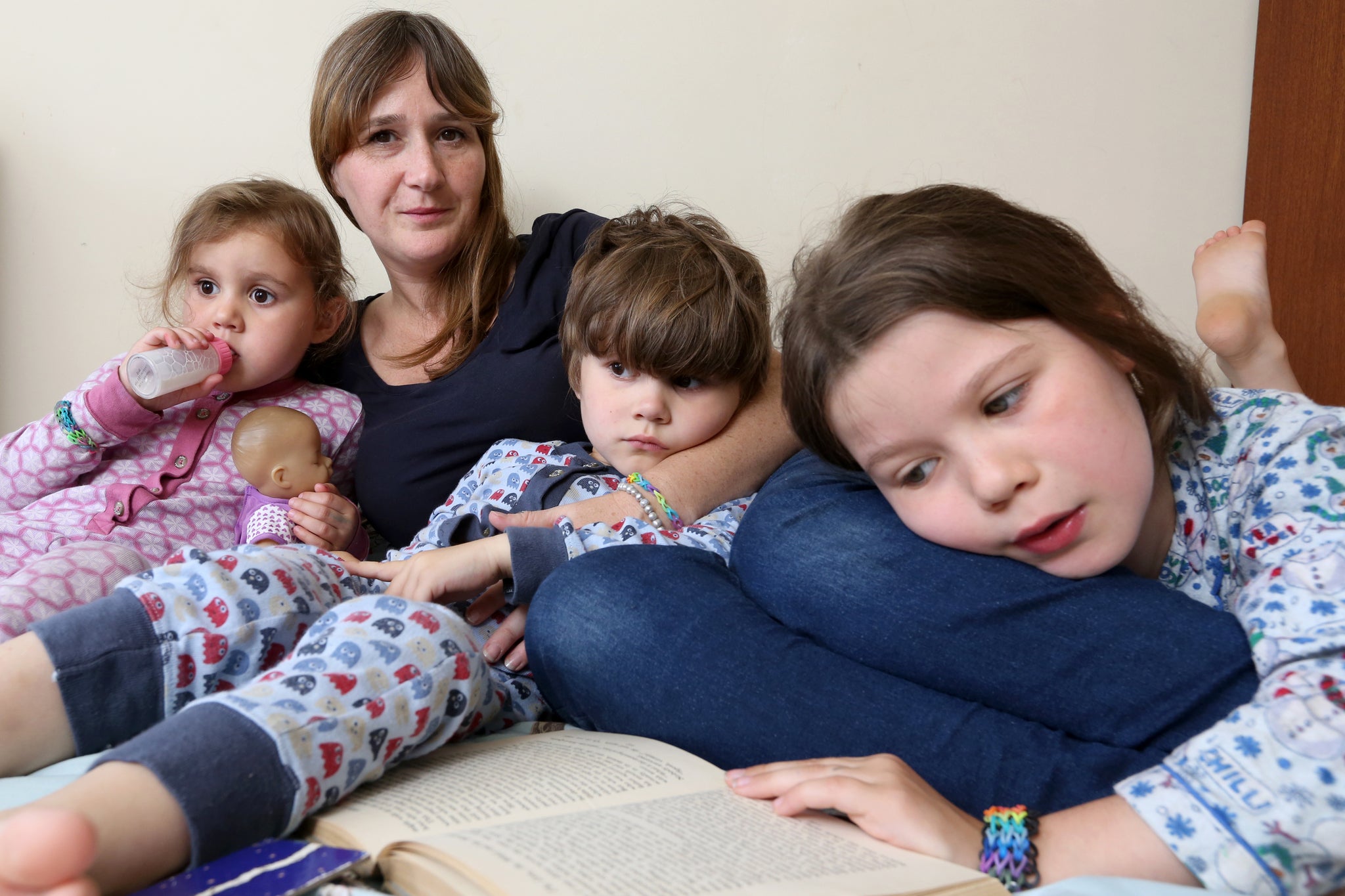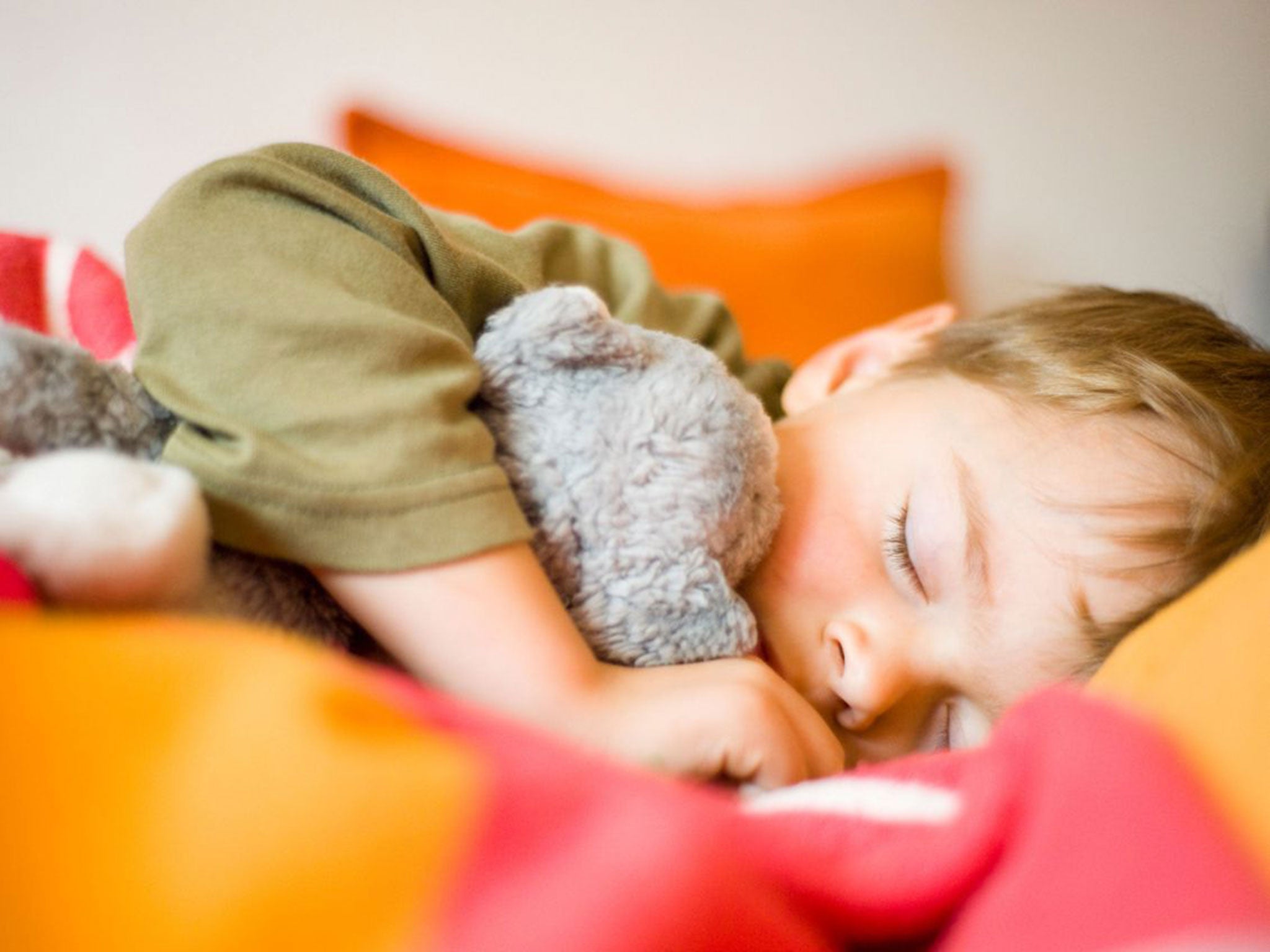Let sleeping sprogs lie: Why the benefits of sharing a bed with your children outweighs the risks
Few parenting methods trigger more debate than co-sleeping. But, for Rebecca Hardy, who has bedded down with all three of her children, the benefits of this age-old practice outweigh the risks

Some time after 3am, my door slowly opens. There is the scuttle of tiny feet, the familiar creak as a small person sinks in besides me. An hour later, comes another little visitor.
Some time after 3am, my door slowly opens. There is the scuttle of tiny feet, the familiar creak as a small person sinks in besides me. An hour later, comes another little visitor.
Another night, another round of musical beds. I have gone to bed with three kids squeezed in beside me. Legs protruding, I have slept with toddlers on my face. We sleep upside down, akimbo. Once, I fell out of bed.
I realise that most other parents occupy a more controlled territory than this. Sleeping with our children is “bad”, but by far the worst crime is sleeping with our babies. The National Institute for Health and Care Excellence (Nice) said so last month, announcing it would be reviewing its recommendations not to co-sleep with babies under three months, instead extending it to babies under one year.
Inevitably, there was an outcry, hardly surprising since, according to the National Childbirth Trust, around half of parents sleep with their babies in the first few months. But the Lullaby Trust welcomed the move, saying five babies die a week from Sudden Infant Death Syndrome (Sids) and the safest place for a baby to sleep is in its cot. Just a few days ago, a woman in Manchester was arrested for “causing death to a child by overlaying” after a baby, believed to be her granddaughter, suffocated in her bed.
But the NCT has asked for “a more holistic approach”. “The studies I have looked at show no significantly increased risk for parents who are in a safe sleeping environment and not drinking, smoking, or sleeping on a sofa,” says Rosie Dodds, the NCT’s senior policy adviser. “They haven’t talked about the risks of putting your cot in another room.”
Peter Fleming, professor of infant health at Bristol University and a consultant paediatrician, says that Nice is trying to make simple what isn’t simple. “I am very disappointed. It’s like looking at car-driving and young adult deaths and saying we should inform people that car-driving carries big risks. For one thing, it totally ignores the benefits of breastfeeding, which significantly reduces the risk of Sids.”
Fleming cites an ongoing longitudinal study of 14,000 babies which showed “a strong two-way relationship between bed-sharing and breastfeeding. Those who bed-shared earlier were more likely to be breastfeeding later. One US study showed that infant mortality is 25 per cent higher for bottle-fed babies than breast-fed. And parents most likely to bed-share are non-smoking, older mums with supportive partners, a group who have the least risk of Sids.”
Eyebrows have also been raised at some of the research used, such as the Carpenter Study from London School of Hygiene and Tropical Medicine, which apparently showed “a five-fold increased risk for co-sleeping babies”, as the Daily Mail helpfully headlined at the time.
Scratch the surface and the picture is less clear-cut. For one thing, the paper concludes that Sids is still a risk from co-sleeping, even if the baby is breastfed and the parent doesn’t smoke or drink. However Fleming, who left the study because he didn’t agree with the methodology, says that three of the five studies didn’t ask parents about drinking and some of the data is imputed, with rates of alcohol consumption from Scandinavia applied to Scotland. “Hardly the same,” he says.
The study also doesn’t differentiate between unplanned co-sleeping (falling asleep by accident on the sofa or armchair) and planned (where safety advice is followed).
“If you lump them together, you get a much higher risk,” says Fleming. “We have investigated many babies’ deaths where the mother took the baby downstairs because the health visitor had warned against co-sleeping and ended up falling asleep on the sofa – almost 10 times the risk.” Because as any breastfeeding mother knows, sometimes you do nod off.

The Carpenter Study isn’t the only one that Nice uses, but as someone who co-slept with all three children when they were babies (not together), it seems a bit rich that my meticulous set-up is lumped together with someone falling asleep on the sofa. Like many co-sleepers, baby slept beside me (not between us), on a firm mattress on the floor with no gaps (no danger of falling or becoming wedged), in a baby sleeping bag (so no duvets or pillows which could overheat or smother). No drink, drugs or fags.
Yet, to the tired new parent, these kind of cases and alarming statements from healthcare professionals add to the confusing cacophony. Surely, rather than demonising the parents’ bed, we should be informing people about the risks and allowing them to make their own decisions?
Yet Nice’s move seems to be part of a wider rejection of bed-sharing in general, an approach typically branded as “attachment-style” parenting and falling out of favour. We’re seen as a woolly, tofu-munching tribe, yet this style of parenting is grounded in hard, cold science. The Mental Health Foundation (MHF) recently launched a campaign promoting the importance of healthy attachments (through “sensitive, consistent and responsive care”). “Massive amounts of evidence show insecure attachments are linked to disruptive anti-social behaviour in adolescents, and problems forming relationships,” says Viviana Finistrella, an early years manager at the MHF. “Healthy attachment significantly affects brain development, helping babies grow more neural pathways.”
Psychologist Oliver James agrees, citing a 2009 University of Delaware study that shows that mothers of “securely attached infants” had night-time interactions that were generally more consistent, sensitive and responsive than those of insecurely attached infants: babies who were picked up and soothed when they fussed or cried.
You don’t have to bed-share with your children to provide good attachments, of course, but as anyone knows who has slept with their child, you can become very attuned.
“Attachment theory is one of the most researched and supported theories,” says James. “As far as I know, there is no study comparing bed-sharing versus not, but studies suggest that contact is good. The attachment benefits far outweigh the supposed dangers. There is good reason to suppose that letting your child into your bed is good for them, so long as it doesn’t wreck your marriage!”
This is a good point, of course. Kate Roberts, a child clinical psychologist, says that many parents struggle with co-sleeping, particularly with older kids. “Young children are being pressured to achieve very early on, so they are clingy at home and parents are compensating at bedtime. Then the problems begin when the kids are eight or older and can’t sleep alone. A child needs to learn independence so they can do normal things – have sleepovers etc.”
For me, the crucial distinction is “need”. If your school-age child needs to sleep with you, that’s probably not so great, but when it comes to an occasional night-time snuggle, what’s so bad about that? “Sleeping close to the parent probably increases oxytocin, the ‘happy hormone’,” says Darcia Narvaez, professor of psychology at the University of Notre Dame, who points out that in most cultures throughout history, families slept together. “Traditionally, in Japan, kids sleep with someone until adolescence.” Roberts, however, speculates that maybe these cultures didn’t have the same expectations of individualism that we have.
“We’re expecting them to be independent in some ways but not in others. That’s not healthy, psychologically.”
For parents desperate to reclaim their bed, she says, “You have to be willing to endure the uncomfortable transition. Establish boundaries without sacrificing the comfort. Set up time for a cuddle out of the bedroom: half an hour before bedtime, perhaps.”
Ultimately, for me, the proof is in the pudding. All my kids seem happy, secure and bright. I’m all for independence, but I also value nurturing so, on the weight of the evidence, I think I can cope with a few more night-time visitors. I’m just not so sure about their dad.
Join our commenting forum
Join thought-provoking conversations, follow other Independent readers and see their replies
Comments